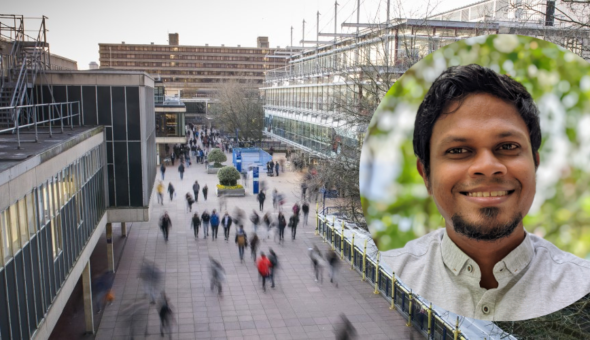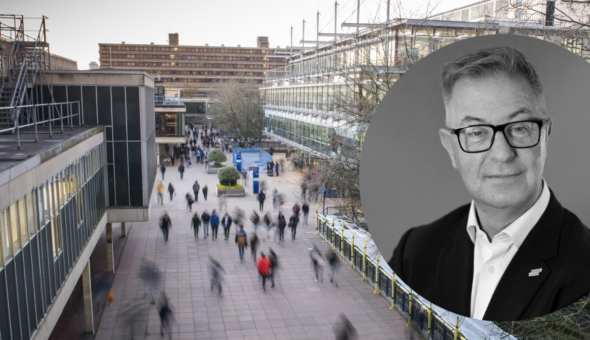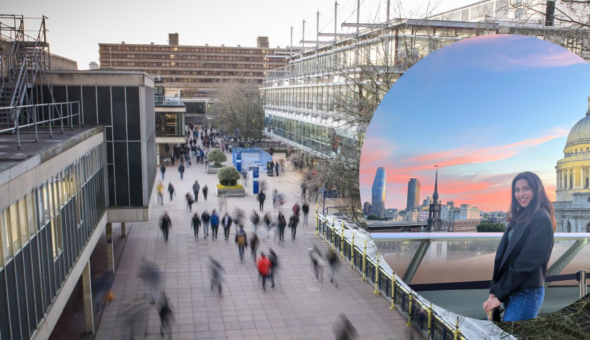It’s amazing that something as tiny as yeast can spark an academic journey as vast as Dr Sue Bowen’s, who has gone from studying biochemistry at Bath to becoming a science, technical and medical (STM) editor in the STM publishing sector. When she wasn’t looking through a microscope lens, she was behind a camera, sitting on the PhotoSoc committee and hosting an exhibition on biodiversity. She shares her story with us.
 Why did you choose to study at Bath?
Why did you choose to study at Bath?
At the time I applied for a PhD in the '90s, the University of Bath was building a good reputation for innovative research, and I was delighted to be offered a place to study there.
I was very interested in the effects of stress on evolution and was already familiar with a lot of the work that was being conducted in the biology and biochemistry department.
A project to study the effects of stress and stationary phase in yeast cells appealed to me and seemed like it would generate lots of data. In fact, the work kept me busy for a few years and was very motivating.
Did you have a particular career in mind when you chose your course?
When I initially left school, I followed a career in media and publishing, concentrating on graphic design and photography. At the same time, I was very interested in biology and was hoping I could combine both publishing and science, so I applied for a biology degree at Cardiff University.
During my first degree I was very interested in the influence of environmental factors of plant-insect interactions and ended up creating an undergraduate project on that topic. Afterwards, I really caught the ‘research bug’, which is why I chose to study biochemistry at PhD level at Bath.
Can you tell us about your experience of studying here?
I have fond memories of walking up to the University from my accommodation. My favourite route was up Sham Castle Lane, over a stile to Sham Castle (which offered beautiful views across the city), through a few fields, and over a bridge to campus.
At the University, I looked forward to collecting data and discussing the results and future direction of the project with my PhD supervisor.
Although my work took up a lot of time, I found it was useful to have an alternative interest when I felt like a break from studying and joined some of the societies run by the Students’ Union. As the University is located on one campus, it is easy to organise events to raise awareness about certain issues or promote a charitable cause.
Because of my background in photography, I was a member of the PhotoSoc committee and organised an exhibition on biodiversity after reading a book called The Sixth Extinction by Richard Leakey and Roger Lewin. In addition to inspirational images on biodiversity from students, the exhibition also included work from local artists and University staff, and a well-known ecologist contributed photos of musk deer conservation and a biodiversity project in Sri Lanka.
Thanks to help from the University, the exhibition was a great success, and it was also shown at Green Park Station in Bath.
What are some of your favourite aspects of the city?
The city itself is always buzzing with events and exhibitions. The Bath Royal Literary and Scientific Institution in Queen Square hosts an abundance of interesting talks and events. It is worth adding your name to their mailing list.
Additionally, I’d recommend visiting The Forum and The Little Theatre, a quirky cinema that screens current blockbusters and less well-known movies. Plus, if you have some spare time between assignments, the Roman Baths offers free admission for university students.
Describe your career journey since graduating.
Since I graduated, I have held a few postdoctoral contracts in various molecular subjects at the universities of Bristol, Leicester and Bath. Mostly these have involved using yeast as a molecular tool in a technique called yeast 2 hybrid, which measures protein-protein interactions.
I did not have the ambition to become a lecturer so there was only a limited distance I could travel in research without funding. However, during my search for postdoctoral contracts, I stumbled across an alternative career path in scientific, technical, and medical (STM) editing, which I have enjoyed immensely, and this has provided me with a decent income for the last 10 years.
What is a typical day like in your role?
In life sciences, the aim is to have your research published in one of the thousands of scientific journals – my job is to process articles before they are published. It is important to get work published in STM research to obtain further funding and for career progression.
My role in STM editing allows me to combine my earlier interest in publishing with the knowledge I have acquired in science over the years. My work involves either editing STM manuscripts for researchers whose first language is not English or preparing manuscripts for publication in STM journals.
On a typical day, I go through the work on my timetable and finish off any manuscripts that need to be completed by a specific deadline. I never tire of reading through the manuscripts – the subject matter can be unusual and very interesting.
On the rare event that I have some spare time, I write articles for blogs (mostly about science and editing) and have compiled some of these into a popular science book about yeast.
How did your studies help you to develop?
My studies in Bath have helped develop my career significantly. If I had not taken a PhD, I doubt that I would have been familiar with the research and publication process in science. I now understand how important it is for researchers to publish their work and am pleased to be able to help them in that process.
In addition, I have travelled all over the world visiting colleagues that I have met through research. Bath is still one of my favourite cities because of its unique atmosphere and I remain an avid tourist.
What advice would you give to prospective students thinking about studying your course at Bath?
I would encourage prospective students to take up an offer at the University of Bath because it will be a positive experience leading to other opportunities. The University has lots of facilities and societies and, therefore, it is possible to gain other skills, certificates, and awards in addition to a postgraduate qualification.
When I first embarked on my PhD studies, I was concerned about the financial impact, but the University has lots of paid part-time work and is very keen to help students financially. During my studies, I not only paid off my existing debt but also managed to travel abroad occasionally.
There are also funding bodies that can help with travel to conferences and meetings both at a national and international level. This allows you to mingle with other students and researchers at other universities in the UK and abroad.
You will not regret studying at the University of Bath because there are limitless opportunities to meet interesting people and to create lifelong memories.
Respond



